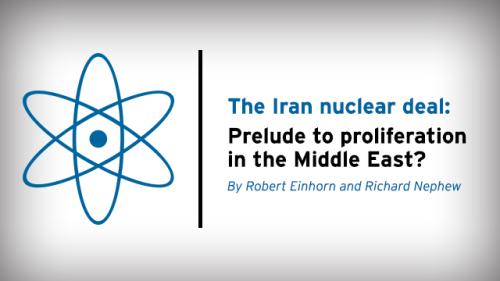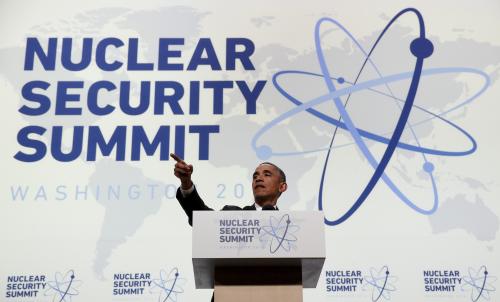The Democratic People’s Republic of Korea (DPRK or North Korea) allegedly tested a hydrogen bomb on January 6. As of now, there is no credible scientific evidence that an actual hydrogen or thermonuclear bomb—which has greater destructive power than an atomic bomb—was detonated, despite what Pyongyang boasts. Yet, even if the explosion did not involve a real hydrogen bomb (something only the five original nuclear powers—United States, Russia, France, United Kingdom, and China—possess for certain), Pyongyang’s nuclear ambitions were fully on display.
How large an ambition does the North Korean regime really have? When and how do aspiring nuclear powers decide that they have “enough”? And enough for what purpose?
Don’t be fooled
Most reasonable analysts have assumed that deterrence against foreign intervention or invasion, particularly by the United States, is Pyongyang’s primary goal. But North Korea need not go toward the power of hydrogen in order to have a practical deterrent. Most countries do not officially recognize the DPRK as a nuclear state, but they do regard it as a de facto nuclear power. And even if the nuclear arsenal and delivery mechanisms are far fewer and inferior to that of the United States, China, Russia, or India, the common view of the top leader as unpredictable and irrational make North Korea seem seriously volatile and dangerous.
North Korea wants to make sure that the United States will not treat it like another Libya or Iraq, but the reality is that Washington is already careful because of the country’s small but credible nuclear capability and infrastructure. Hydrogen bombs can do more damage per detonation, but they would not alter significantly the credibility of North Korea’s deterrence capability.
In pursuing the power of hydrogen, Pyongyang is forced to tell the naked truth that the nuclear program is indeed for military purposes.
What good does hydrogen do for Pyongyang’s often stated narrative that its nuclear program involves the development of nuclear energy for civilian use? To make such a claim regarding hydrogen power would be a bald-face lie. Yes, hydrogen is a renewable source that is relatively kind to the environment and much more efficient than gasoline and other fossil fuels. In 2003, the George W. Bush administration pledged $1.2 billion for hydrogen research and development as alternative energy. But no country has the technology or money to transform hydrogen into a stable, storable, and widely available form of energy. In pursuing the power of hydrogen, Pyongyang is forced to tell the naked truth that the nuclear program is indeed for military purposes.
If the ability of producing and successfully testing a hydrogen bomb is about demonstrating technological prowess and filling North Korean citizens with pride for their leadership, they and we already know the real truth about the state of average people’s technology in the DPRK: broken-down trucks that run on wood-fire fuel and break down again and again, daily blackouts and rationed electricity, ball-point pens that don’t click on and off at one’s command. If the people want pride, they already have it in the good old-fashioned atomic weapons, computer technology that can hack into Sony Pictures, and the glass-adorned skyscrapers racing upwards in Pyongyang. Will they really marvel at a hydrogen bomb?
Budding friendships
On the other hand, the DPRK can claim that its scientists and engineers have achieved something their South Korean counterparts have not. But Seoul is fighting back with highly effective low-tech weaponry: loudspeakers at the demilitarized zone that will resume propaganda broadcasts on Friday, January 8. For sure, they will scream out criticisms of the regime, not “Happy Birthday” music to honor Kim, as the alleged H-bomb was supposed to do.
So, is there a military or political purpose to developing thermonuclear weapons, or is North Korea headed toward the habit of acquisitiveness and accumulation of “weapons of overkill” like other nuclear states? How much and at what point will the DPRK reach “enough”?
Pyongyang’s act of defiance may generate new friendships and a more united front against it—something North Korea does not want. In my view, the test on January 6 was more of a slap to Beijing’s face than a violent dance to get the attention of Washington. President Xi Jinping and the Chinese Communist Party leadership swallowed their pride and disgust at the unsavory behavior of Kim Jong-un and his elite team, and had tried to improve relations with Pyongyang since late summer. Liu Yunshan, a member of the Standing Committee of the Chinese Politburo, traveled to Pyongyang to help celebrate the 70th anniversary of the founding of the Korean Workers’ Party. He was the highest-ranking Chinese official that Kim Jong-un has ever met. This move by Beijing was intended to bring some warmth to the Sino-North Korean relationship and to make it clear to Pyongyang that further nuclear testing or launches of missiles would be unwise.
In my view, the test on January 6 was more of a slap to Beijing’s face than a violent dance to get the attention of Washington.
Mr. Xi and the elders in Beijing may understand wisdom, but Mr. Kim seems intent on eschewing wisdom and pursuing swashbuckling youthful acts like nuclear testing. The latest test is akin to giving Beijing the finger and beating the chest, loudly yelling “Juche! Independence! I’m going at it alone!”
In doing so, Pyongyang is making it possible for China, Japan, South Korea, and the United States to work together in coming up with a regional and international response. The four have had a tough time finding common ground, but the power of hydrogen may be the force that binds them together.



Commentary
Why is North Korea pursuing hydrogen power?
January 7, 2016